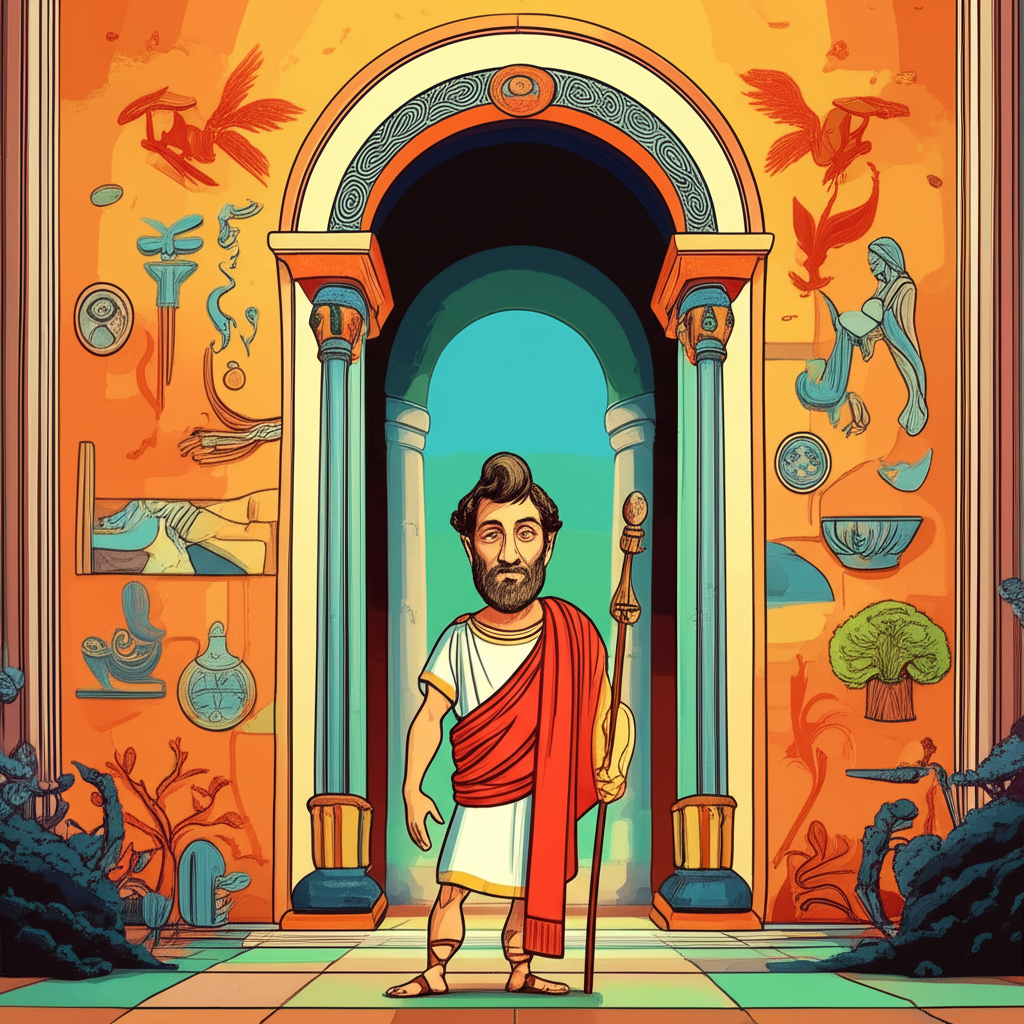
The tapestry of ancient Greece is woven with tales of gods and goddesses, heroes and monsters, a vibrant mythology that sought to explain the world and humanity’s place within it. Among these enduring narratives, the Judgment of Paris stands as a pivotal moment, a seemingly small act of divine vanity that rippled outwards, ultimately igniting the flames of the Trojan War. But before Paris, the handsome prince of Troy, was tasked with choosing the most beautiful goddess, a darker, more potent prophecy cast a long shadow over the proceedings – the Prophecy of Styx. This is a story rooted in the rich cultural soil of Hellenic civilization, a testament to the power of storytelling to grapple with profound human emotions and the capricious nature of fate, as understood by ancient peoples.
The era in which these myths flourished was one of burgeoning city-states, where life was often dictated by the unpredictable forces of nature and the perceived will of immortal beings. Ancient Greeks lived in a world where the divine was not a distant concept but an active, often meddling, presence. Their worldview was steeped in a sense of awe and apprehension, recognizing the vast power that lay beyond human comprehension. The gods, with their passions and rivalries, mirrored human foibles on a grander, more terrifying scale. This mythology provided a framework for understanding natural phenomena, societal structures, and the very essence of human experience, from love and war to justice and retribution. The Prophecy of Styx, therefore, emerges from this fertile ground of polytheistic belief and a deep-seated awareness of the potential for divine anger and cosmic imbalance.
At the heart of this prophecy lies the formidable entity known as Styx. In the ancient Greek cosmology, Styx was not merely a river; she was a primordial goddess, a titaness, and the embodiment of an unbreakable oath. Her domain was the underworld, the somber realm where the souls of the departed journeyed. Styx was depicted as a figure of immense power and solemnity, her very name evoking a chilling dread. She was the daughter of the titans Oceanus and Tethys, making her one of the oldest and most respected of divine beings. Her river, the infernal Styx, was a boundary between the living and the dead, a dark, swirling current that no mortal or even many gods dared to cross without dire consequence. To swear an oath by the waters of Styx was the most sacred and binding vow imaginable. To break such an oath meant incurring the wrath of Styx herself, a punishment so severe that even Zeus, the king of the gods, was bound by it. The symbolic attributes of Styx are manifold: she represents immutability, the unyielding nature of oaths, the finality of death, and the terrifying consequences of divine displeasure. Her presence in the prophecy serves as a stark reminder of the weight of celestial decisions and the potential for catastrophic repercussions.
The narrative of the Prophecy of Styx, while often overshadowed by the more famous Judgment of Paris, weaves a chilling prelude to that fateful event. It is said that Eris, the goddess of discord, often a disgruntled guest at divine celebrations, was not invited to the wedding of Peleus and Thetis. In her anger and desire for retribution, she cast a golden apple inscribed with the words "For the Fairest" into the midst of the wedding feast. This act of spite, though seemingly small, set in motion a chain of events that would ultimately lead to the prophecy’s fulfillment.
The divine squabble that ensued saw Hera, queen of the gods, Athena, goddess of wisdom and warfare, and Aphrodite, goddess of love and beauty, all claiming ownership of the apple. Zeus, wisely, refused to intervene, knowing the fury that would be unleashed upon him by the rejected goddesses. Instead, he decreed that the judgment should be left to a mortal, the handsome Trojan prince Paris. However, before Paris was to make his choice, an ominous pronouncement echoed through the divine realms, a prophecy whispered on the winds that carried the scent of the underworld.
This was the Prophecy of Styx. It foretold that the choice of the fairest goddess, made under the shadow of Eris’s golden apple, would not be a simple matter of aesthetics. Instead, it would unleash a torrent of divine wrath and mortal suffering. The prophecy suggested that the goddess chosen would be granted a prize that would sow seeds of jealousy and conflict, a prize so coveted that it would ultimately lead to a devastating war, a war that would stain the very waters of Styx with the blood of heroes. It spoke of oaths broken, of alliances shattered, and of a city brought to ruin. The prophecy implied that the celestial order itself would be tested, and that the consequences of this mortal judgment would echo through eternity, a testament to the inescapable power of divine decrees and the fragile peace of the mortal world. The whispers of Styx served as a grim premonition, a cosmic sigh of impending doom, reminding all that even the most beautiful of decisions could be fraught with darkness.
The symbolism embedded within the Prophecy of Styx is rich and multifaceted, offering a glimpse into the anxieties and aspirations of ancient Greek society. The goddess Styx herself, as the embodiment of oaths and the underworld, represents the ultimate consequence of divine transgression. Her prophecy speaks to the ancient understanding of a universe governed by intricate rules and the severe repercussions of their violation. The act of choosing the "fairest" symbolizes the human fascination with beauty and desire, but also the potential for these qualities to become sources of envy and conflict. The golden apple, a symbol of temptation and discord, highlights the insidious nature of jealousy and how seemingly trivial acts can escalate into widespread destruction. The prophecy can be interpreted as a reflection of the ancient Greeks’ awareness of the volatile nature of power, both divine and mortal, and the constant struggle to maintain balance in a world susceptible to chaos. It also speaks to the fear of war, a recurring reality in their fragmented political landscape, and the profound impact it had on human lives.
In the modern world, the Judgment of Paris and its associated prophecies continue to resonate, finding new life in various forms of media and academic study. The narrative is a cornerstone of classical literature, frequently referenced and reinterpreted in novels, poems, and plays that explore themes of beauty, ambition, and the destructive nature of conflict. In visual arts, the scene has been a perennial subject for painters and sculptors, each artist bringing their own interpretation of the goddesses’ allure and the fateful moment of choice. Contemporary video games often draw inspiration from Greek mythology, featuring characters and scenarios inspired by these ancient tales, bringing them to a new generation of audiences. Academically, the myth is a subject of intense study within classical, literary, and religious studies, where scholars analyze its historical context, symbolic meanings, and enduring cultural impact. The Prophecy of Styx, though less commonly cited than the judgment itself, adds a layer of ominous foreshadowing that enriches these modern interpretations, highlighting the perceived inevitability of fate and the tragic consequences of divine meddling.
In conclusion, the Prophecy of Styx, interwoven with the Judgment of Paris, is a powerful narrative from the ancient Greek mythological tradition. It serves as a vivid illustration of how our ancestors sought to understand the world around them, imbuing natural phenomena and human endeavors with divine agency and cosmic significance. It is crucial to remember that this is a story, a product of human imagination and cultural expression, not a divinely revealed truth. As Muslims, we recognize that only Allah (God) is the true Creator and Sustainer of the universe, and that all power and authority belong to Him alone. Yet, by exploring these ancient tales, we gain invaluable insights into the cultural heritage of humanity, the enduring power of storytelling, and the timeless themes that continue to shape our understanding of ourselves and the world, even as we hold fast to our faith. These narratives, though products of a different worldview, offer a window into the collective human experience, reminding us of the enduring capacity for both beauty and destruction that lies within the human heart and the vastness of imagination.




